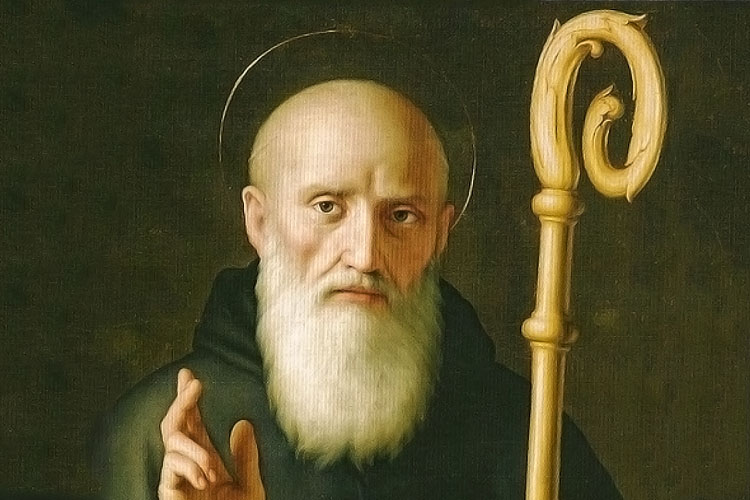
St. Benedict of Nursia, abbot
 St. Benedict was born at Nursia in Umbria in about 480 and was sent to Rome to be educated, but soon left the world to live a solitary life at Subiaco. After living in a cave in the mountains for two years as a hermit, he had acquired such a reputation that disciples came in numbers to join him and important Roman families entrusted him with the education of their children. He organized a form of monastic life in twelve small monasteries. Under his guidance, as abbot, the monks vowed to seek God and devoted themselves to work and prayer. A few years later St. Benedict left the district of Subiaco to found the great abbey of Monte Cassino on the heights of Campania. There he wrote his Rule in which are wonderfully combined the Roman genius and the monastic wisdom of the Christian East. St. Benedict died in 547.
St. Benedict was born at Nursia in Umbria in about 480 and was sent to Rome to be educated, but soon left the world to live a solitary life at Subiaco. After living in a cave in the mountains for two years as a hermit, he had acquired such a reputation that disciples came in numbers to join him and important Roman families entrusted him with the education of their children. He organized a form of monastic life in twelve small monasteries. Under his guidance, as abbot, the monks vowed to seek God and devoted themselves to work and prayer. A few years later St. Benedict left the district of Subiaco to found the great abbey of Monte Cassino on the heights of Campania. There he wrote his Rule in which are wonderfully combined the Roman genius and the monastic wisdom of the Christian East. St. Benedict died in 547.
Despite Benedict’s desire for solitude, his holiness and austerities became known and he was asked to be their abbot by a community of monks at Vicovaro. He accepted, but when the monks resisted his strict rule and tried to poison him, he returned to Subiaco and soon attracted great numbers of disciples. He organized them into twelve monasteries under individual priors he appointed, made manual work part of the program, and soon Subiaco became a center of spirituality and learning. He left suddenly, reportedly because of the efforts of a neighboring priest, Florentius, to undermine his work, and in about 525 settled at Monte Cassino.
He destroyed a pagan temple to Apollo on its crest, brought the people of the neighboring area back to Christianity, and in about 530 began to build the monastery that was to be the birthplace of Western monasticism. Soon disciples again flocked to him as his reputation for holiness, wisdom, and miracles spread far and wide. He organized the monks into a single monastic community and wrote his famous rule prescribing common sense, a life of moderate asceticism, prayer, study, and work, and community life under one superior. It stressed obedience, stability, zeal, and had the Divine Office as the center of monastic life; it was to affect spiritual and monastic life in the West for centuries to come.
While ruling his monks (most of whom, including Benedict, were not ordained), he counseled rulers and Popes, ministered to the poor and destitute about him, and tried to repair the ravages of the Lombard Totila’s invasion. He died at Monte Cassino on March 21.
Source: CatholicCulture.org


No Comments